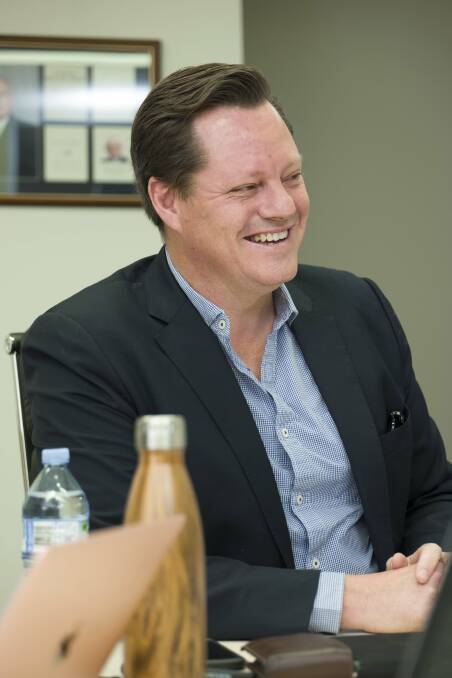
The head of Australia's peak meat industry body says he's "pissed off" with Victorian government plans to reduce processing capacity in Melbourne's abattoirs and processing plants.
Subscribe now for unlimited access to all our agricultural news
across the nation
or signup to continue reading
Premier Daniel Andrews announced changes to processing capacity at meat processing plants as part of an extension of coronavirus controls.
"Changes will be made to metropolitan businesses operating in high-risk industries - like abattoirs, meat, poultry and seafood processing - with additional obligations such as workforce limits and mandatory surveillance testing to be implemented," Mr Andrews said.
The Australian Meat Industry Council chief executive Patrick Hutchinson says there'll be a 20 per cent reduction in the workforce for members with 25 or more staff, from midnight tonight.
That could have an impact on between 20 to 40 businesses around Melbourne.
But he said AMIC doesn't expect its members to implement mandatory surveillance testing.
"I'm 'pissed off,' the industry is 'pissed off'," Mr Hutchinson said.
"We have been completely disregarded, after being pilloried by Andrews last year, then told everyone understands our industry," Mr Hutchinson said.
"The best health advice doesn't take any consideration, at all, of industry advice.
"I don't want to hear the Premier (Mr Andrews) continue to tell me, and others, he understands our industry.
"Because, obviously, he doesn't; if he did, he would have asked us what programs we are implementing."
Mr Hutchinson said the industry had been tackling coronavirus 'harder and faster' than any other sector.
"Other than construction, we are the only industry that's being targeted.
"I use the word targeted, because I think what our industry feels is this is what you'd class as an easy hit.
"This is just, 'let's pick an industry out of a hat' - it was an opportunity to pick low-hanging fruit, not discuss it with industry, but just dump on it."
COVID-safe industry
He said members had invested millions of dollars in Victorian metropolitan and regional abattoirs to lead - not only Australia, the state and potentially the world - COVID-safety management.
"I want to emphasise millions of dollars, with limited, to no investment from the government," he said.
"That was almost our cost, for doing business."
The government had entirely disregarded what the industry had done.
"We led training and accreditation of COVID-safe marshalls, with our own safety training program."
Mr Hutchinson said the decision send the message meat processing was not a safe place to work.
"That is absolutely incorrect," he said.
He feared many workers would leave the sector.
It also coincided with the coming spring flush for lamb.
"We know 50 per cent of lamb, processed in this country, is processed in Victoria," he said.
"We know that normally starts to occur in mid-September, so you are effectively throwing a competitive curveball into the market.
"Capacity to process livestock, in Victoria, at a peak time, will be reduced without any consultation with the industry itself."
Thomas Elder Markets analyst Matt Dalgleish agreed the decision came at an "ominous time" for the sector.
"September brings the start of increased weekly lamb yarding levels with average weekly volumes lifting from 25,000 head per week during August to around 37,000 per week in September, according to the five-year average trend," Mr Dalgleish said.
"In October this lifts again to about 60,000 head of lamb. During November/December it is not uncommon to see weekly lamb yarding levels between 90,000 to 130,000 head."
Less competition from processors, if they were backed up due to worker capacity constraints, could see a sharp drop in the Eastern States Trade Lamb Indicator.
"It is not out of the question that processing bottlenecks during the spring flush could see the ESTLI ease 30 per cent or so, from current levels, which would put the ESTLI back under 700c/kg cwt," he said.
Victorian and NSW lamb yarding levels have been easing over the last fortnight, possibly in response to the announcement that Fletcher's Dubbo sheep and lamb processing plant was going to suspend their buying activity for a week.
"Price declines in the ESTLI from late winter to summer can usually be seen of around 15per cent to 20pc," he said.
"The potential for the Victorian abattoir restrictions to reduce processing capacity could place additional price pressure during spring, particularly if the restrictions drag on into late spring or early summer."
Mr Hutchinson said Agriculture Victoria had been exceptionally supportive of the sector.
"Unfortunately, they are not the decision makers and can only provide information to the decision makers, who obviously don't understand our industry and potentially aren't really interested."
A state government spokesperson said it was working with the industry to develop the best approach that protected businesses, workers and all Victorians.
Agriculture Victoria continued to engage with essential industries, including meat processing, to support the management of COVID-19 risks to the state's food supply.



